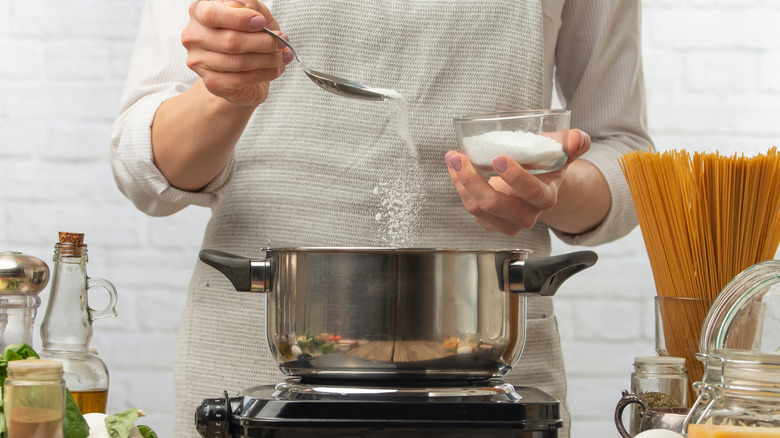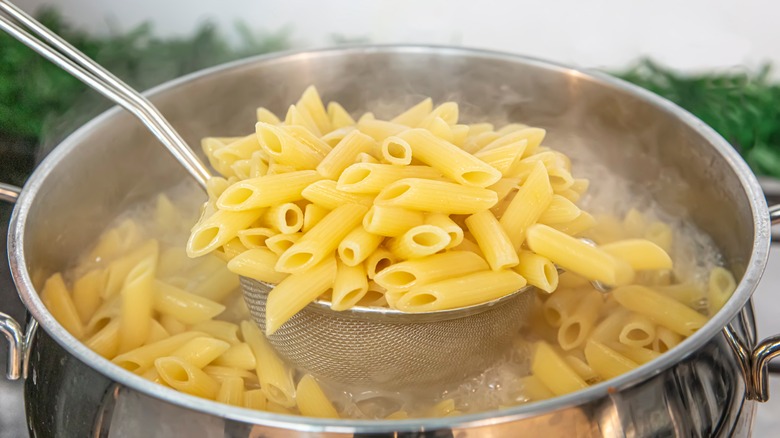Why It's So Critically Important To Properly Salt Your Pasta Water
It's no surprise that the world loves pasta. Whether or not you grew up in an Italian family, you probably have a few memories of sharing a spaghetti and meatball meal with your family. Or, perhaps, your dad made a mean Penne Alla Vodka or Fettuccine Alfredo instead. Regardless, no matter how you prefer to consume yours, pasta has become of the most classic and traditional food dishes throughout the world. According to International Pasta Organisation, approximately 16 million tons of pasta were produced in the world in 2019. Even more, 90% of Americans eat some type of pasta while 60% of Italians eat it every single day. Needless to say, there is a high demand for it.
With all the various pasta recipes, one step is always the same — the need to boil and soften the noodles. No matter what kind of pasta dish you decide to conjure up in the kitchen and serve to your family and friends, how you prep and boil your pasta noodles could make or break the whole dish. If you're one to be more go-with-the-flow in the kitchen rather than a recipe follower, take heed, there's one that you should never skip: Salting your pasta water.
Enhance the flavor of your pasta with salt
If you haven't yet learned that salt is your best friend in the kitchen, then now is the time. There's a reason why you've always seen your mother and grandmother add salt to the pot of water for pasta dishes. According to Whole Foods, adding salt to the pot of water before it starts boiling will bring more "savory, flavorful results" to the pasta when it is cooked.
Martha Stewart takes it a step further, noting that adding salt to the pot of water adds an overall salty seasoning to each noodle. This allows the noodles to gradually soak up hints of salty flavor over the 15 to 20 minutes of boiling time, resulting in a brighter and bolder taste. It's suggested to taste the pasta as it's cooking to see if more salt needs to be added.
According to "The Queen of Italian Cooking," Marcella Hazan, as noted in her cookbook "The Essentials of Classic Italian Cooking" (via Food52), you should use at least 1 ½ tablespoons of salt per pound of pasta. Additionally, she suggests adding salt to the water when it comes to a boil for the best results.
Debunking the faster boiling water myth
Throughout your years in the kitchen, you may have heard some misinformation surrounding the addition of salt to a pot of water. Some people claim that it can speed up the boiling process while others claim the opposite, saying salt makes pasta take longer to cook. So, are either of these statements true? The answer is no.
According to Thermtest Instruments, adding salt to water does increase the boiling point as well as the heat capacity, or the "amount of heat that is required to raise the temperature of a substance by degree Celsius." But because you're usually only adding a minimal amount of salt for every pound of pasta, it doesn't have much of an effect in terms of speeding up the boiling effect.
Of course, cooking and baking anything in different parts of the country and world will play an effect on cooking time. interestingly, for someone living at a higher elevation, it will take less time for water to boil compared to someone living at sea level (via Martha Stewart). But no matter how long it takes your pasta water to boil, don't forget to add the salt.


